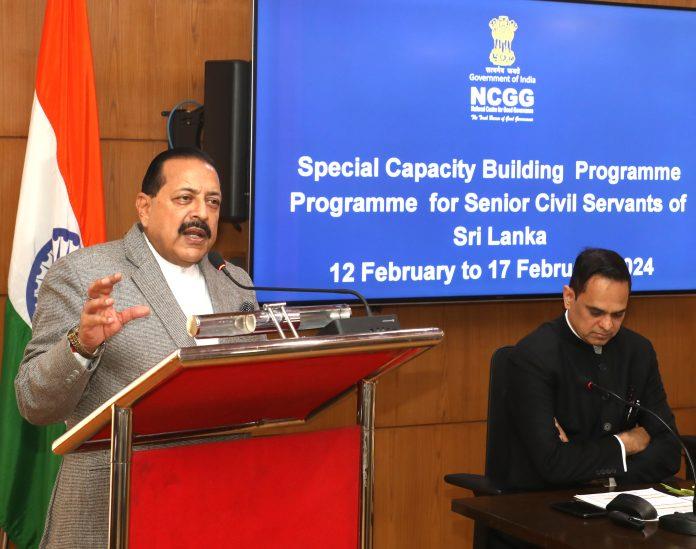Modi’s Governance Reforms Helped Indian Economy Through Huge Savings: Dr Jitendra
TNN Bureau. Updated: 2/15/2024 6:24:36 PM
National

NEW DELHI, Feb 15 : Governance reforms under Prime Minister Narendra Modi have helped the Indian economy through huge savings.
Technology is being widely used to result in savings and in delivery of utilities as well as services to the public.
This was stated by the Union Minister of State (Independent Charge) Science & Technology; MoS PMO, Personnel, Public Grievances, Pensions, Atomic Energy and Space, Dr Jitendra Singh while addressing the participants of the ‘Special Capacity Building Programme for Senior Civil Servants of Sri Lanka’ here today.
Dr Jitendra Singh said, adopting Direct Benefit Transfer (DBT) has resulted in saving of Rs.1 lakh crore by removing middlemen and also saved millions of poor households from starvation during the Covid Pandemic.
Besides, the Government also saved Rs.65,000 crore through the Government e-marketplace (GeM) portal.
Quoting PM Modi’s recent speech where he stated that Governance is his government’s top priority , Dr Jitendra Singh said, the governance reforms of the last 10 years under PM Modi have gone beyond the realms of mere governance by improving the work culture as well as providing an optimum working environment,while at the same time resulting in far reaching socio-economic benefits in the long run.
Dr.Jitendra Singh highlighted Prime Minister Narendra Modi’s “Neighbours First” policy and similarities in culture as well as the people to people ties that both the countries share.
The hallmark of 10 years of Governance transformation under PM Modi has been Transparency, Accountability, and time-bound Delivery of services with the use of technology wherever required, he said.
The Union Minister reiterated PM Modi’s vision of ‘Minimum Government Maximum Governance’ highlighting the government’s women centric initiatives such as giving Maternity leave even in case of a Still Birth. Referring to the recent amendment to the Prevention of Corruption Act, 1988, the union minister said the Government under PM Modi has zero tolerance on Corruption and Terrorism.
Dr Jitendra Singh said, the ‘Department of Administrative Reforms and Public Grievances’ (DARPG) has emerged as a nodal department.
As reforms evolved over the years, the best practices and success stories have been followed by other countries such as South Africa and the United Kingdom, he said.
Highlighting progress of DARPG, the DoPT Minister said that CPGRAMS is among the best grievance redressal mechanisms across the world, having over 95 percent redressal. Human Interface has been introduced for public feedback after disposal of grievances and reduced litigations through technology means. Besides, Face Recognition Technology is being used for the first time in issuing Digital Life Certificates to ensure Pensions to genuine beneficiaries, he said.
Secretary DARPG and Director General NCGG, V. Shrinivas, while giving opening remarks, highlighted that NCGG has conducted several capacity building programmes for Sri Lankan Civil servants but this is the 1st high-level CBC programme of senior level civil servants of Sri Lanka.
Head of Sri Lankan delegation, Anura Dissanayake, who is Secretary to the Prime Minister of Sri Lanka, recalled the official visit of Sri Lankan President on 21st July last year and expressed their interest in inspiration from India’s economic growth under PM Modi and help revive Sri Lanka’s public sector by learning and adopting India’s best practices and success stories. The delegation also appreciated India’s progress in implementation of Digital services and institutions such as Lokpal and Central Vigilance Corruption in curbing corruption.